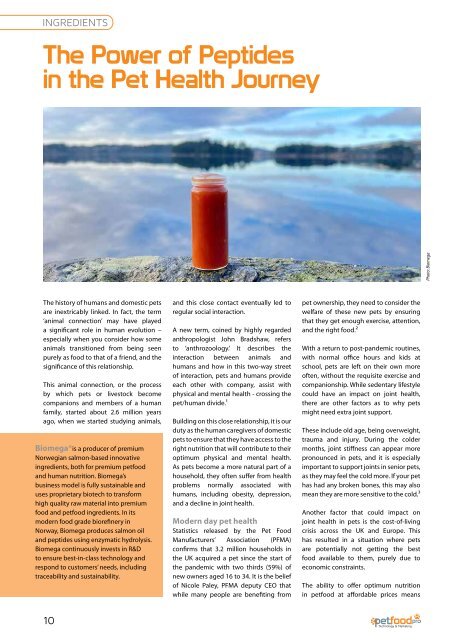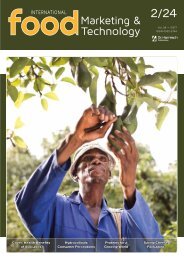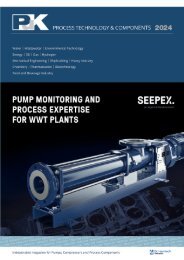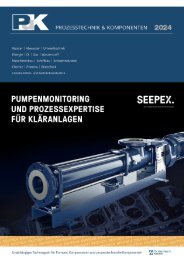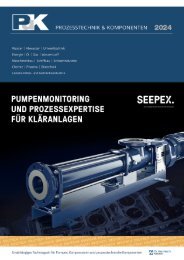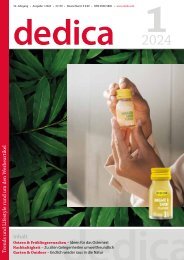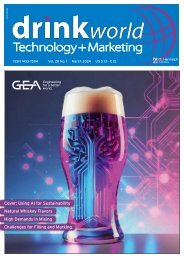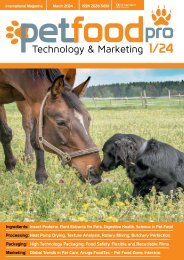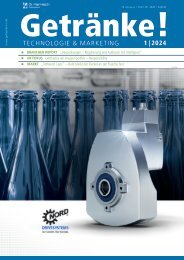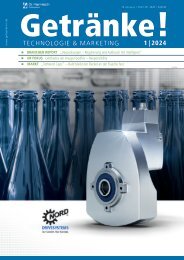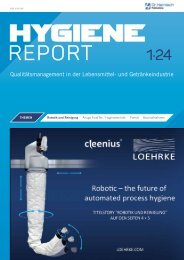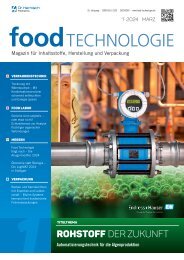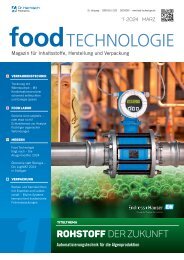petfood pro 3/2022
PetFood PRO is the international magazine for executives and specialists in the manufacture of food for domestic animals – the pet food industry. The magazine focuses on food and delicacies for dogs, cats and other small animals, ornamental birds and fish, as well as animals kept in terrariums. We publish feature articles, reports and announcements about new ingredients, technology, equipment and processes, packaging machinery and materials as well as marketing trends and developments. Readers are executives, product developers and specialists in the pet food industry, including process and packaging engineers. PetFood PRO will be published in English. Circulation is worldwide, with an emphasis on important growth markets.
PetFood PRO is the international magazine for executives and specialists in the manufacture of food for domestic animals – the pet food industry. The magazine focuses on food and delicacies for dogs, cats and other small animals, ornamental birds and fish, as well as animals kept in terrariums.
We publish feature articles, reports and announcements about new ingredients, technology, equipment and processes, packaging machinery and materials as well as marketing trends and developments. Readers are executives, product developers and specialists in the pet food industry, including process and packaging engineers. PetFood PRO will be published in English. Circulation is worldwide, with an emphasis on important growth markets.
Create successful ePaper yourself
Turn your PDF publications into a flip-book with our unique Google optimized e-Paper software.
INGREDIENTS<br />
The Power of Peptides<br />
in the Pet Health Journey<br />
Photo: Biomega<br />
The history of humans and domestic pets<br />
are inextricably linked. In fact, the term<br />
‘animal connection’ may have played<br />
a significant role in human evolution –<br />
especially when you consider how some<br />
animals transitioned from being seen<br />
purely as food to that of a friend, and the<br />
significance of this relationship.<br />
This animal connection, or the <strong>pro</strong>cess<br />
by which pets or livestock become<br />
companions and members of a human<br />
family, started about 2.6 million years<br />
ago, when we started studying animals,<br />
Biomega®is a <strong>pro</strong>ducer of premium<br />
Norwegian salmon-based innovative<br />
ingredients, both for premium <strong>petfood</strong><br />
and human nutrition. Biomega’s<br />
business model is fully sustainable and<br />
uses <strong>pro</strong>prietary biotech to transform<br />
high quality raw material into premium<br />
food and <strong>petfood</strong> ingredients. In its<br />
modern food grade biorefinery in<br />
Norway, Biomega <strong>pro</strong>duces salmon oil<br />
and peptides using enzymatic hydrolysis.<br />
Biomega continuously invests in R&D<br />
to ensure best-in-class technology and<br />
respond to customers’ needs, including<br />
traceability and sustainability.<br />
and this close contact eventually led to<br />
regular social interaction.<br />
A new term, coined by highly regarded<br />
anthropologist John Bradshaw, refers<br />
to ‘anthrozoology.’ It describes the<br />
interaction between animals and<br />
humans and how in this two-way street<br />
of interaction, pets and humans <strong>pro</strong>vide<br />
each other with company, assist with<br />
physical and mental health - crossing the<br />
pet/human divide.1<br />
Building on this close relationship, it is our<br />
duty as the human caregivers of domestic<br />
pets to ensure that they have access to the<br />
right nutrition that will contribute to their<br />
optimum physical and mental health.<br />
As pets become a more natural part of a<br />
household, they often suffer from health<br />
<strong>pro</strong>blems normally associated with<br />
humans, including obesity, depression,<br />
and a decline in joint health.<br />
Modern day pet health<br />
Statistics released by the Pet Food<br />
Manufacturers’ Association (PFMA)<br />
confirms that 3.2 million households in<br />
the UK acquired a pet since the start of<br />
the pandemic with two thirds (59%) of<br />
new owners aged 16 to 34. It is the belief<br />
of Nicole Paley, PFMA deputy CEO that<br />
while many people are benefiting from<br />
pet ownership, they need to consider the<br />
welfare of these new pets by ensuring<br />
that they get enough exercise, attention,<br />
and the right food.2<br />
With a return to post-pandemic routines,<br />
with normal office hours and kids at<br />
school, pets are left on their own more<br />
often, without the requisite exercise and<br />
companionship. While sedentary lifestyle<br />
could have an impact on joint health,<br />
there are other factors as to why pets<br />
might need extra joint support.<br />
These include old age, being overweight,<br />
trauma and injury. During the colder<br />
months, joint stiffness can appear more<br />
<strong>pro</strong>nounced in pets, and it is especially<br />
important to support joints in senior pets,<br />
as they may feel the cold more. If your pet<br />
has had any broken bones, this may also<br />
mean they are more sensitive to the cold.3<br />
Another factor that could impact on<br />
joint health in pets is the cost-of-living<br />
crisis across the UK and Europe. This<br />
has resulted in a situation where pets<br />
are potentially not getting the best<br />
food available to them, purely due to<br />
economic constraints.<br />
The ability to offer optimum nutrition<br />
in <strong>petfood</strong> at affordable prices means<br />
10<br />
Technology & Marketing


